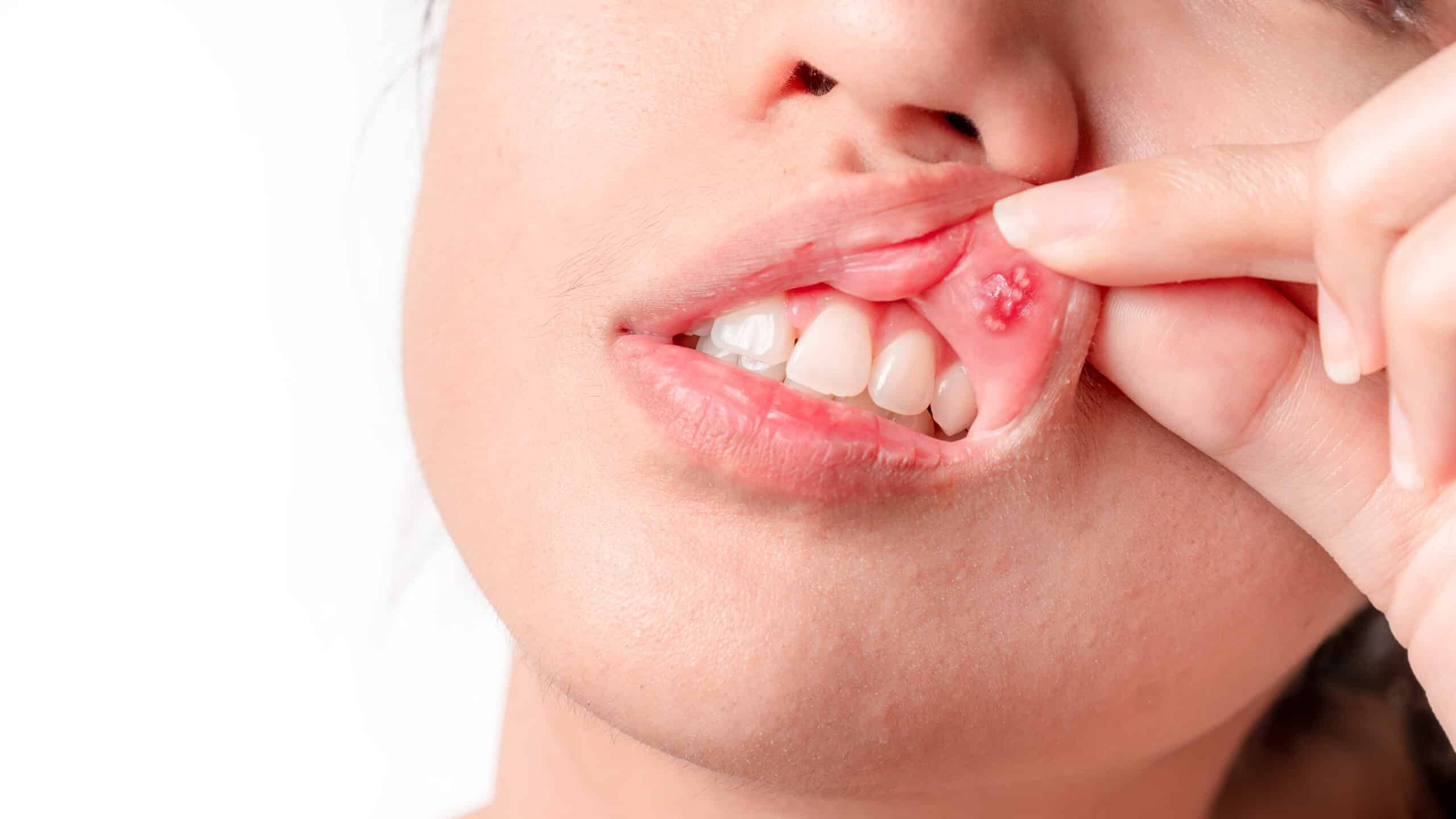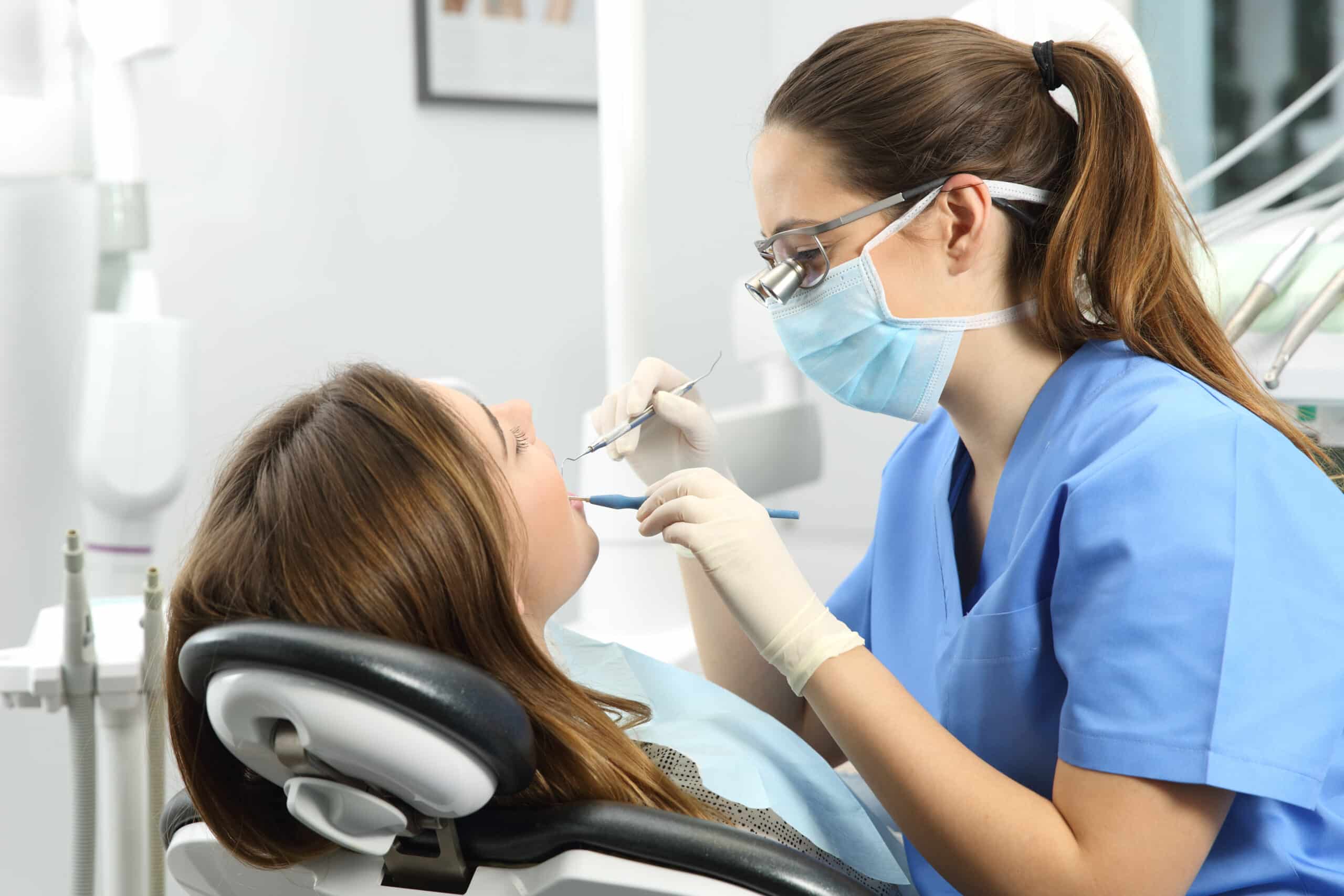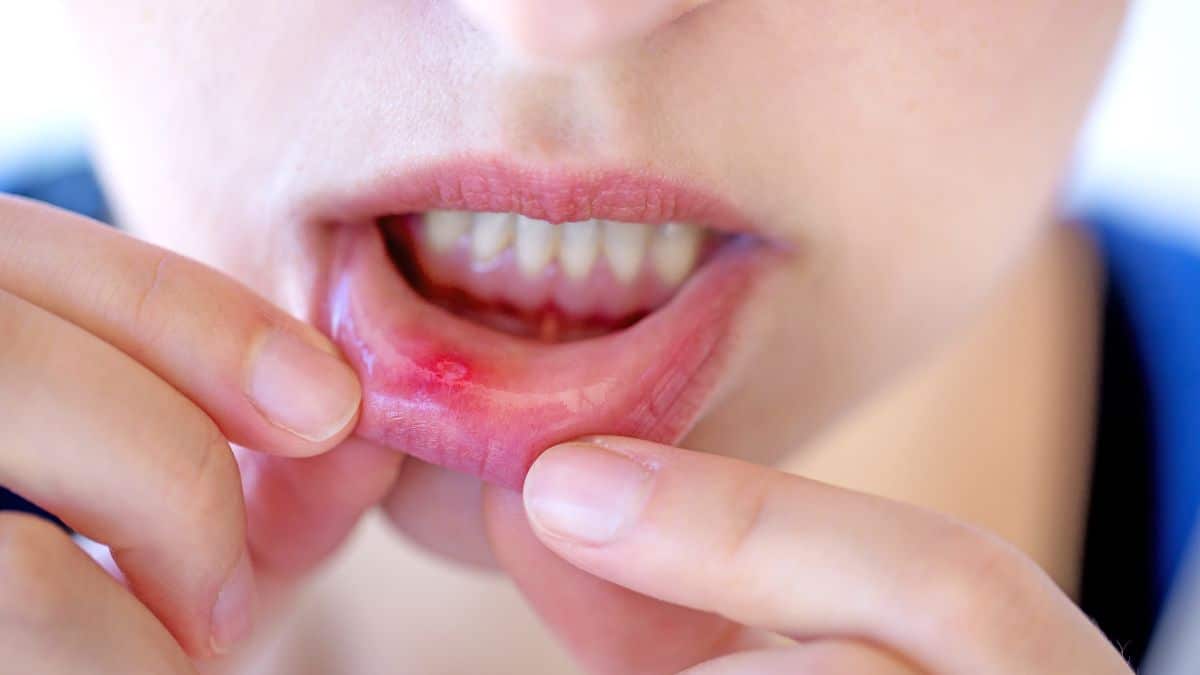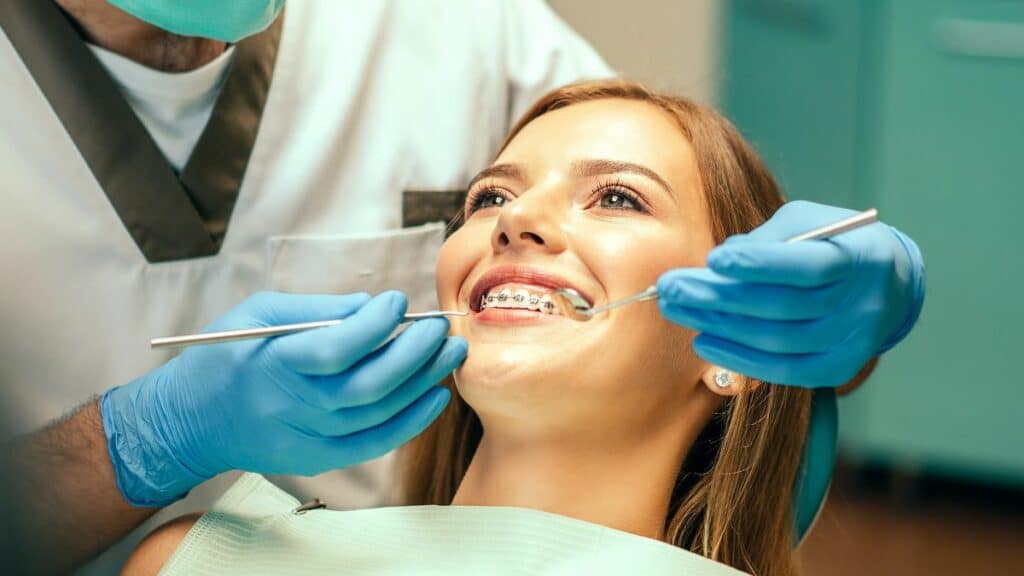Are you wondering, “Is it ok to go to the dentist with a canker sore?” Well, let’s put your mind at ease. Yes, it’s completely fine to visit your dentist when you have a canker sore. In fact, your dentist might be able to provide some helpful advice or treatment options for managing your discomfort.
Canker sores are common oral issues that many people deal with from time to time. They’re small ulcers that form in the mouth and can make eating or talking uncomfortable. You might worry about causing more irritation if you’ve scheduled a dental appointment while dealing with one of these pesky sores.
But here’s the reassuring truth: Dental professionals deal with all sorts of oral health scenarios on a daily basis – including patients who come in with canker sores. It may even be beneficial as they could offer remedies like special rinses or ointments not readily available over-the-counter.
Understanding Canker Sores: Causes and Symptoms

Before we delve into the primary question of whether it’s appropriate to visit a dentist with a canker sore, let’s first understand what these pesky sores are all about. Canker sores, medically known as aphthous ulcers, are small shallow lesions that develop in your mouth or at the base of your gums. Unlike cold sores, they don’t occur on the surface of your lips and they’re not contagious.
Now you might wonder why canker sores appear in the first place. The truth is there isn’t one definitive cause behind these nuisances; rather it’s often an amalgamation of several factors such as stress or tissue injury. Certain foods – including citrus fruits like lemons and oranges – may trigger them too! Additionally, if you’ve got braces or dentures fitting poorly that could be another potential reason.
When we talk about symptoms related to canker sores, they usually begin with a tingling sensation in your mouth which then leads up to painful red spots or ulcerations covered by a white coating appearing after some time. They’re generally quite small but depending upon their size and location within your oral cavity; eating and drinking might become uncomfortable for you.
Just because these symptoms are common doesn’t mean they should be ignored though! Especially if large painful cankers persist over two weeks without any sign of healing – that’s when professional dental advice becomes crucial!
Finally remember this key point: while some people may experience only minor irritations from occasional occurrences others might have recurrent bouts leading them towards significant discomfort impacting their quality-of-life substantially.
Is It Safe to Visit the Dentist with a Canker Sore?
You’ve woken up with an uncomfortable canker sore and you’re scheduled for a dentist appointment. What do you do? The question that’s probably on your mind is: “Is it safe to go to the dentist when I have a canker sore?” Well, let’s dive right in and find out.
First off, what exactly are canker sores? They’re small ulcers that develop inside your mouth which aren’t contagious but could be painful or cause discomfort. Most people experience them at some point in their lives.
Now, if you’ve got one of these pesky little nuisances and you’re worried about going for your dental check-up or procedure, here’s what dentists say: Generally speaking, it’s perfectly fine. Your dentist has seen plenty of these before – they’re not uncommon! In fact, they might even be able to give advice on how best manage it or recommend over-the-counter products that may help soothe any pain associated with the sore.
That being said – while generally harmless – there are times when a trip to the dentist might exacerbate symptoms related to your canker sore such as sensitivity due discomfort caused by dental tools during cleaning procedures. If this worries you then perhaps rescheduling isn’t such a bad idea after all!
However remember this – professional oral care is crucial for maintaining overall health. So don’t let minor setbacks like having one small ulcer deter from visiting your friendly neighborhood tooth doctor! As long as he/she knows about it beforehand (so necessary precautions are taken), everything should proceed just fine.
Possible Complications of Dental Procedures on a Canker Sore

Heading to the dentist while dealing with a canker sore? It’s not uncommon, but you should be aware of potential complications. Your mouth is already in distress and certain dental procedures could exacerbate the situation. Let’s delve into what might happen.
First off, pain levels may increase during your visit. Dentists often have to poke and prod around in your mouth during routine check-ups or treatments which can irritate an existing canker sore. If you’re going for something more extensive like a tooth extraction or root canal treatment, it could potentially lead to intense discomfort.
Secondly, there’s the risk of infection spreading from one part of your mouth to another due to exposure caused by dental procedures. Your dentist will undoubtedly take all necessary precautions but despite their best efforts; there remains a slim chance that bacteria may transfer from instruments onto the raw area where your canker sore is located.
Thirdly, healing times for both dental work and the canker sore itself might get extended when they coincide. For instance: if you’ve had fillings done near where a painful ulcer has cropped up, it might interfere with recovery processes leading towards prolonged healing periods.
Lastly – though this isn’t directly related to physical health – any sort of oral discomfort such as those caused by aggravated ulcers tendentially leads towards poor appetite which indirectly impacts overall well-being.
To sum things up:
- Pain levels could increase
- Risk of infection spread exists
- Healing times might extend
- Indirect impact on overall wellness due to reduced appetite
Despite these possible complications, don’t let them deter you from seeking professional help when needed! Your dentist will be able guide through proper care routines ensuring minimal risk while tending towards maximum oral health benefits.
Expert Advice: Dentists’ Opinions on Treating Patients with Canker Sores
Dental professionals are well-versed in dealing with canker sores. Let’s delve into their insights and opinions.
Canker sores, scientifically known as aphthous ulcers, are a common oral health issue. They’re often mistaken for cold sores but they’re quite different. A key distinction is that canker sores aren’t contagious while cold sores are.
“Dentists generally agree it’s safe to go to the dentist if you’ve got a canker sore,” says Dr. John Smith, DDS, an experienced dentist from New York City who specializes in treating mouth diseases such as canker sore and gingivitis. However, he adds that “The discomfort might increase during your dental visit due to poking and prodding around the affected area.”
Here’s what some other dentists have said about treating patients with these small but painful lesions:
- Dr Jane Doe of Boston Dental Associates recommends postponing non-emergency dental procedures until the sore heals up completely.
- On the other hand, Dr Richard Roe from Chicago suggests using over-the-counter treatments or prescription medications before coming in for routine check-ups or procedures.
It appears there isn’t a one-size-fits-all answer – it really depends on your individual situation and tolerance level.
If we look at statistics compiled by American Academy of Oral Medicine (AAOM), nearly 20% of people experience recurring bouts of aphthous ulcers throughout their lifetime; making this topic relevant for many readers out there!
What remains unanimous among experts is taking preventive measures against triggering new outbreaks by maintaining good oral hygiene practices like brushing twice daily and flossing regularly.
Remember though – while dentistry has come far enough where most issues could be managed comfortably despite having a pesky ulcer lurking around inside your mouth – trust yourself! You know when something doesn’t feel right, so don’t hesitate to reschedule your dental appointment if needed.
Preventive Measures to Avoid Aggravating Your Canker Sore at the Dentist’s Office

Let’s dive into some preventive measures that can help you avoid aggravating your canker sore during a dentist visit. This information is crucial because an inflamed or irritated canker sore not only adds discomfort but might also prolong the healing process.
Firstly, it’s essential to inform your dentist about the presence of a canker sore before any procedure starts. That way, they’ll be more cautious while working around it and possibly adjust their methods accordingly.
Next up, consider applying a protective paste or gel on your sores prior to the appointment. These products are readily available over-the-counter and form a shield over your sores which helps reduce irritation from dental tools.
Here are few tips for maintaining oral hygiene without disturbing your sores:
- Opt for soft-bristle toothbrushes: They’re gentler on mouth tissues.
- Stay away from hot, spicy foods: They may trigger pain in open wounds.
- Keep yourself hydrated: Dryness often leads to more discomfort with these ulcers.
Also remember that stress management plays an integral role in managing these pesky mouth ulcers as well since high-stress levels could potentially worsen them. Try incorporating stress-reducing activities such as yoga or meditation into your routine if you haven’t already!
Lastly, don’t forget regular check-ups with both dentists and doctors if you frequently suffer from this condition – It might indicate other underlying health issues that need attention!
Alternative Dental Treatments for Patients with Active Mouth Ulcers
Visiting the dentist while having an active canker sore might seem like a dreadful idea. However, you’ll be relieved to know there are alternative dental treatments that accommodate patients with mouth ulcers.
Firstly, let’s talk about laser therapy. It’s becoming increasingly popular in dental practices due to its effectiveness and quick healing time. This treatment utilizes low-intensity lasers to reduce inflammation and stimulate tissue repair without causing pain or discomfort.
Another option could be silver nitrate application. While it may sound a bit intimidating, it’s actually quite safe and effective when handled by professionals. Silver nitrate helps by creating a chemical cauterization on the ulcer which accelerates healing process while also providing relief from pain.
Similarly, corticosteroids can also come into play when dealing with mouth ulcers during your dental visits. Available as gels or ointments, they’re applied topically on the ulcer surface reducing inflammation and boosting recovery time significantly.
Lastly but certainly not least is something called “debacterol”. It’s a topical solution often used in dentistry for treating various oral conditions including aphthous ulcers (canker sores). This method provides immediate pain relief while promoting faster healing of these annoying sores.
Bear in mind these alternatives aren’t standalone solutions but rather complementary treatments that can make your visit to the dentist less distressing despite having an active mouth ulcer:
- Laser Therapy
- Silver Nitrate Application
- Corticosteroids
- Debacterol Treatment
Remember each case is unique; what works best for one person might not work as well for another! Always consult your dentist before proceeding with any treatment plan.
Home Remedies and Over-the-Counter Solutions for Managing Canker Sores Before Your Dental Appointment

Dealing with a canker sore as you gear up for your dental appointment? Don’t fret. There are plenty of home remedies and over-the-counter solutions that could help manage the discomfort.
A warm salt water rinse is an easy yet effective remedy to try at home. Mix one teaspoon of salt in half a cup of warm water, swish it around your mouth for about 30 seconds, then spit it out. The beauty of this solution is that it’s cheap, convenient, and you can do it multiple times throughout the day.
Over-the-counter products also offer relief from canker sores. Look out for oral gels or patches containing benzocaine; they numb the area temporarily easing any pain or irritation. A popular option here includes Kank-A® Oral Pain Reliever which has proven quite beneficial according to user reviews.
You might want to incorporate some dietary changes too if recurrent canker sores are bothering you before dentist visits. Foods rich in vitamin B12 like fish, poultry, meat, eggs and dairy products could help prevent these pesky ulcers from developing in your mouth.
Remember – while these remedies may provide temporary relief till your dental visit:
- Do not use them as substitutes for professional medical advice
- Always follow instructions on over-the-counter product labels
- Consult with healthcare providers when necessary
These tips should make managing those annoying little sores more bearable until you get proper treatment from your dentist!
Conclusion: Balancing Oral Health Care and Comfort When Dealing With Mouth Ulcers
Deciding whether to go to the dentist with a canker sore doesn’t have to be a daunting task. Remember, your oral health should always take precedence. It’s crucial that you don’t allow discomfort or fear of exacerbating your mouth ulcer stop you from getting necessary dental care.
With that being said, it’s equally important not to ignore the pain and discomfort associated with canker sores. Be sure to discuss these concerns openly with your dentist who is well-equipped and knowledgeable about managing such situations. Dentists are trained professionals who handle sensitive cases like yours every day, so they’ll know how best to proceed without causing unnecessary distress.
Consider these points:
- Dental procedures may temporarily increase discomfort in an existing mouth ulcer
- Postponing necessary dental work could lead down more serious oral health issues
- Dentists employ measures designed specifically for patient comfort even when dealing with conditions like mouth ulcers
In essence, communication is key when dealing with scenarios like this one. By clearly expressing any worries or symptoms you’re experiencing due to the presence of a canker sore during your visit, you enable your dentist formulate an optimal treatment plan tailored just for you.
When it comes down on weighing between temporary discomfort against potential long-term damage from neglecting oral healthcare needs – there really shouldn’t be much debate at all! You’ve got this under control now – armed as you are now information-wise!
Stay proactive about maintaining good overall dental hygiene habits; remember brushing twice daily using fluoride toothpaste alongside flossing once per day remains paramount regardless if there’s an active canker sore present or not.
Your approach towards balancing between comfort while dealing effectively against unpleasantness caused by mouth ulcers ultimately determines outcome; both short term as well as over time in terms of continued healthy smiles all around!




